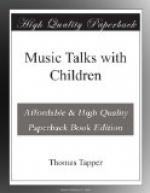First of all, the playing is more difficult to do than the music is to understand. Once a great master of the piano played to a lady who had never heard a great master before, and the playing was like beautiful lace. When it was over and the master had gone away, some one asked the lady how he had played, and she said:
“He played so that the music sounded as I thought it should.”
And they asked her what she meant.
“Always I have been taught,” she said, “to listen to music and to think it. I have been taught this more than I have been taught to play. And the music of the master-composers I always think of as beautiful and simple but hard to make it sound as it should. Often I have heard others say that the music of the masters is dull, and not beautiful, but that is really not what the people feel. It is difficult for them to play the music rightly. And again they cannot understand this: that art is often simple in, its truth, while those who look upon it are not! simple-hearted, as they regard it. This is hard to understand, but it is the true reason.”
Now, if we think of what this cultured lady said, we shall think her wise. Whatever stumbling we may do with our fingers, let us still keep in our minds the purity of the music itself. This will in a sense teach us to regard reverentially the men who, from early years, have added beauties to art for us to enjoy to-day. The wisest of the Greeks [41] said:
“The treasures of the wise men of old, which they have left written in books, I turn over and peruse in company with my friends, and if we find anything good in them, we remark it, and think it a great gain, if we thus become more attracted to one another.”
Once an English lady[42] wrote about a verse-writer: “No poet ever clothed so few ideas in so many words.” Just opposite to this is a true poet, he who clothes in few words many and noble ideas. A master tells his message in close-set language.
Now, in the last minutes, let us see what a great master is:
I. He will be one who tells a beautiful message simply.
II. He has been willing to sacrifice and suffer for his art.
III. He has lived his every day in
the simple desire to know his own
heart better.
IV. Always he has concentrated
his message into as few tones as
possible,
and his music, therefore, becomes filled to
overflowing
with meaning.
About the meaning of the masters, one of them has written this: “Whenever you open the music of Bach, Mozart, or Beethoven, its meaning comes forth to you in a thousand different ways.” That is because thousands of different messages from the heart have been concentrated in it.
CHAPTER XIII.
THE LESSER MASTERS.
“And the soul of a child came into him again.”—I Kings, XVII: 22.




